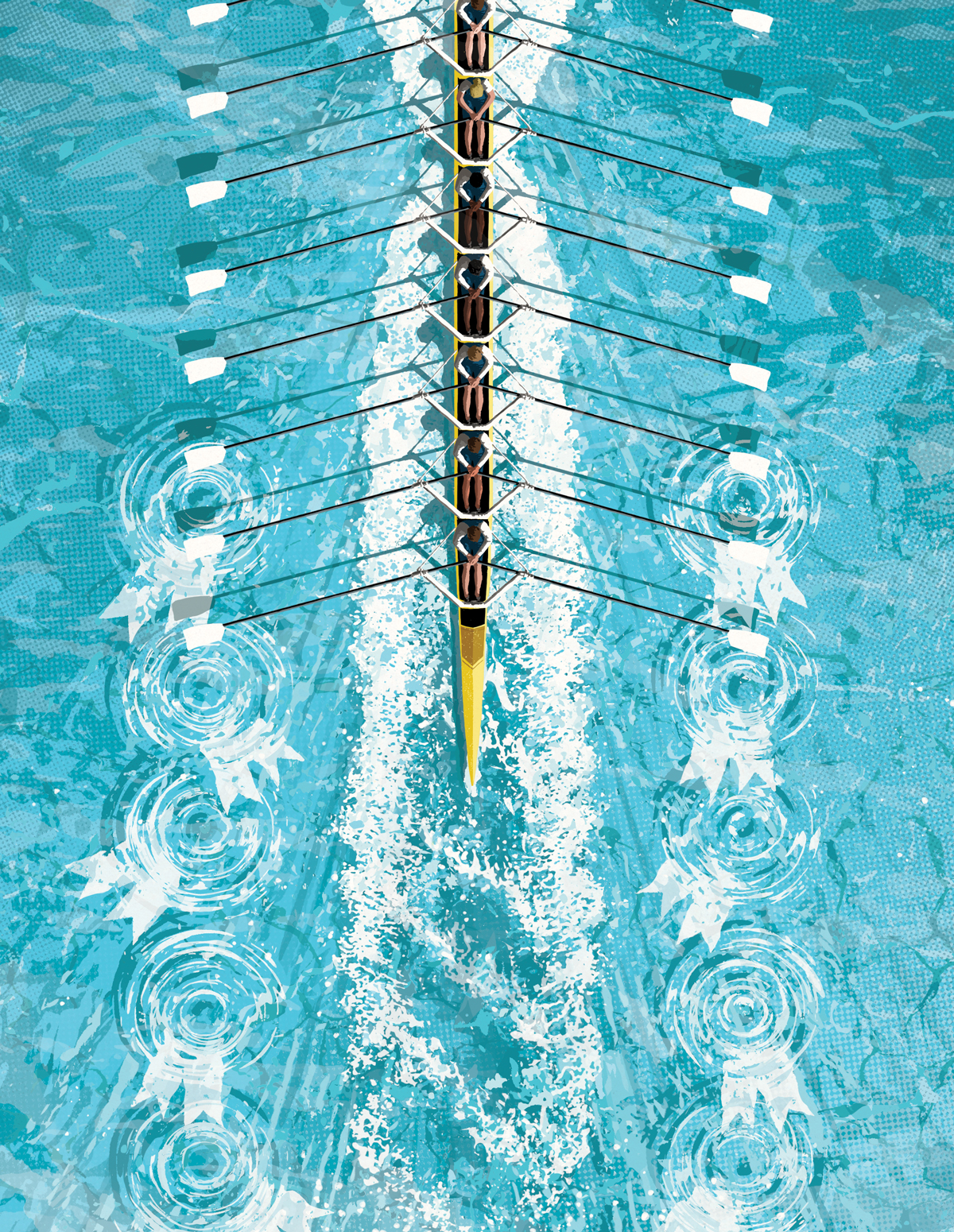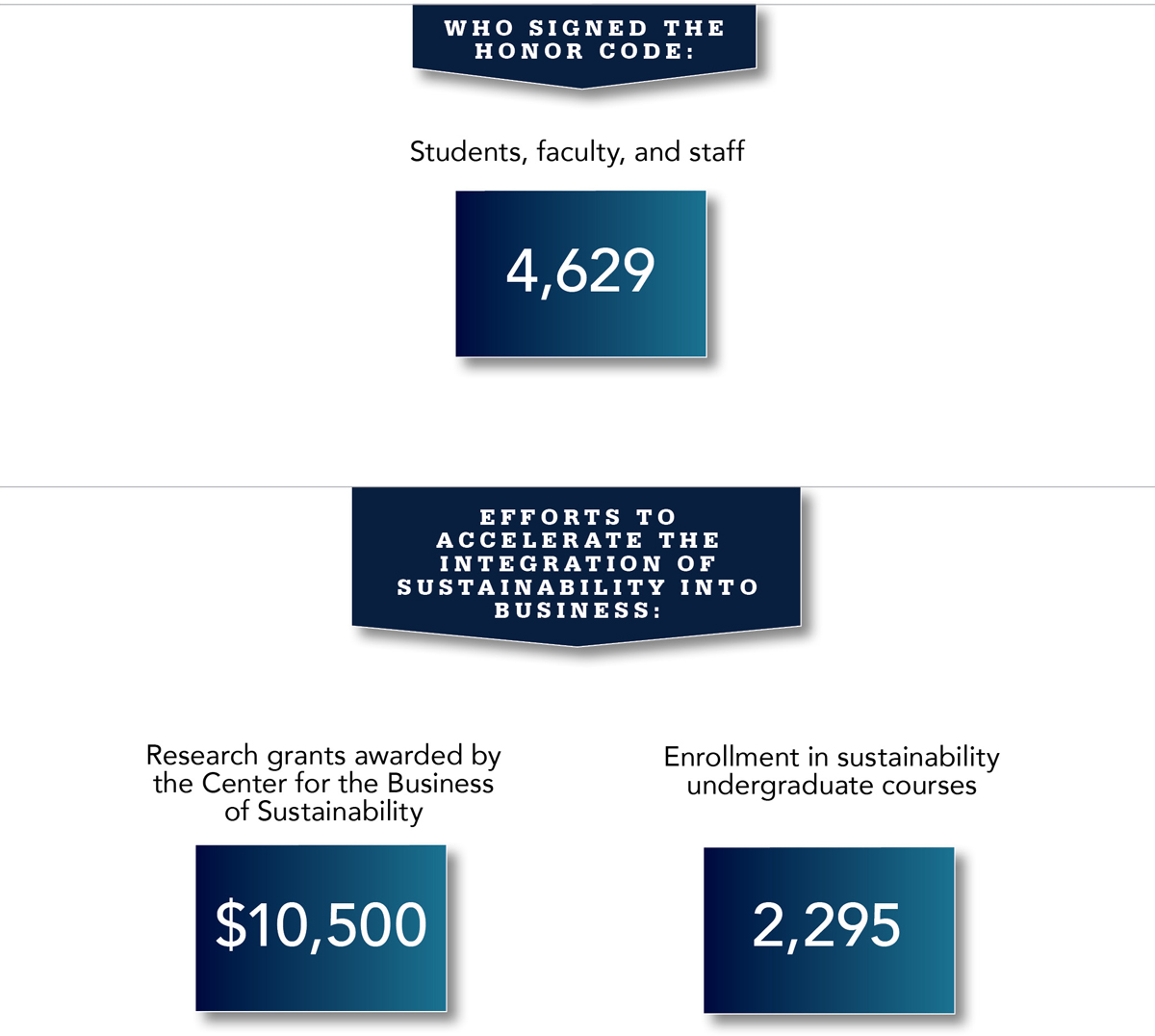How Smeal is preparing the next generation of socially responsible leaders.
As part of her internship with PwC last summer in Los Angeles, senior marketing major Lydia Mabamije attended a Salesforce Summit where teams were tasked with finding solutions to a business problem in just an hour. The problem focused on how an electric vehicle company that decided to move to the international market could remain the market leader.
Some teams, she says, focused on a technological solution. At Mabamije’s urging, her group took a different tack.
“Other teams forgot the important part — the people, as my time on the Smeal Business Ethics Case Team continues to teach me. While presenting our solution, I believe that set us apart from the other teams,” Mabamije says.
“We decided to focus on empowering the people behind the technology. If your company has no values, does not acknowledge where it is extracting value if it decides to merge, then it doesn’t matter how great the technology is. We focused on the process of change.”
As co-captain of the Ethics Case Team, she has learned firsthand about the growing role ethical leadership is playing in the business world.
Smeal’s focus on ethics produces success
In just five years, the Business Ethics Case Team has been transformed. What started as a small group of students trying to navigate ethical thinking and the ultra-competitive world of ethics case competitions is now a burgeoning group that is placing in those competitions and collaborating with other colleges at Penn State.
In the past year, Smeal’s team has experienced an unprecedented run of success:
- First place at the International Business Ethics Case Competition, in both the full competition, as well as the 10-minute version
- Second place at the International Business Ethics and Sustainability Case Competition, the first time it competed
- Second place at the Templeton Business Ethics Case Competition
- Third place in the Ethics stream of the Inter Collegiate Business Competition

Mabamije credits “continuous learning” about ethics for the team’s success and its expanding impact on the ethical culture at Smeal and other colleges within Penn State.
“The active application of theories and solutions definitely help us the most. Having someone as knowledgeable as Michelle Darnell (Smeal’s director of honor and integrity and the director of the Tarriff Center for Business Ethics and Social Responsibility) and the two-way style of learning she’s implemented within the team allows me to be taught and also teach without any hesitation,” she says.
“We have our weekly meeting with her where we do a deeper dive into texts, articles, and current affairs and dissect the lack or presence of ethical decision-making.”
The team’s success has helped to bolster not only its reputation but also other colleges’ desire to collaborate with Smeal.
A Penn State alum, Andy Hoffman, made a $25,000 commitment to support collaborations between Penn State’s Rock Ethics Institute in the College of the Liberal Arts and Smeal’s Business Ethics Case Competition Team. Each year Smeal will include one to two Liberal Arts students and expand its training to prepare a team for the APPE (Association for Practical and Professional Ethics) Intercollegiate Ethics Bowl.
That comes on the heels of Smeal’s collaboration with the Engineering Leadership Development Program. Mabamije and Roman Nagirniak, a third-year electrical engineering major and engineering leadership development minor, advanced to the Elite 8 out of 73 universities in the fifth annual Lockheed Martin Ethics in Engineering Case Competition.
“Prior to our collaboration with them, they got eliminated in the first round. However, through our collaboration, we were able to make the top 8 out of 73 schools in a single-bracket elimination style. It was such a unique experience being able to bring that much success, especially since it was my first year. I am looking forward to that collaboration this year,” Mabamije says.
Ethical literacy a differentiator for recruiters, employers
In her weekly meetings with the Business Ethics Case Team, Darnell says she started noticing an encouraging trend. As team members talked about their conversations with corporate recruiters, whether for an internship or a full-time job, those recruiters were especially interested in learning about the knowledge students had gathered on the case team.
“It is often the first follow-up question they ask after I mention my role in the team,“Mabamije says. “They inquire about the thought process, and how I see businesses utilizing such a framework. We also often discuss my experience with casing with certain companies and the business problems they are facing.”
Ashley Rippey, executive director of Smeal’s Business Career Center, says a higher percentage of employers are searching for students who possess particular soft skills.
“Having someone as knowledgeable as Michelle Darnell (Smeal’s director of honor and integrity and the director of the Tarriff Center for Business Ethics and Social Responsibility) and the two-way style of learning she’s implemented within the team allows me to be taught and also teach without any hesitation.”
In a recent survey of employers who recruit Smeal students, 73 percent agreed or strongly agreed with the statement “In comparison to other business schools, Smeal students demonstrate a greater than average sense of ethical awareness and ethical judgment.” Of those same employers, 76 percent said they specifically ask questions about honor and integrity in the interview process and 96 percent said it is important that Smeal incorporates honor and integrity as a strategic goal for the college.
An increasing number of employers are leveraging Smeal students’ advanced understanding of business ethics early in their careers.
Emma Pirchalski, a 2020 management information systems grad, was a founding member of the Business Ethics Case Team. In her role on the artificial intelligence (AI) governance team at PwC, Pirchalski says her participation on the Ethics Case Team helped her understand the practical aspects of ethical behavior and decision-making, how these practices shape cultural norms, and the importance of anticipating potential impacts before they arise. The ability to proactively address ethical implications in various scenarios is crucial to governing AI, especially given the scale and the rapidly evolving nature of these capabilities.
“Collaborating across functions and engaging diverse stakeholders across the development process is a key facet of AI governance,” she says. “In my role, I work with data scientists, academics, risk management, privacy, and legal teams to develop processes that streamline responsible development. Having these perspectives represented throughout the development process ultimately helps organizations build better AI systems to achieve goals, in alignment with their values.
“Working on the case team showed me that these decisions are rarely easy, but creating a structure for collaboration can help organizations identify where important decisions need to be made and establish an understanding and appreciation across functions.”
Other, older, alumni recognize the same trends.
Jim Brandau graduated from Smeal with a finance degree in 2003, when the Smeal Honor Code was still three years from being created. Still, in his role as a managing director and wealth advisor with William Blair & Company’s private wealth management group, he is well aware of Smeal’s culture of honor and integrity and how important it is that students be imbued with that understanding.
Recognizing that, Brandau has been able to both witness and influence Smeal’s culture of integrity as the president of the Smeal Alumni Society Board, a participant in Smeal’s Alumni Mentoring Program, and a member of the Smeal Board of Visitors. He even mentored a Business Ethics Case Team member last year.
“It’s absolutely critical,” he says. “There are many, many days where you come across a situation in your career where there are different paths you can take to find a solution. Often you could take a shortcut that’s easier, but it may not be the most optimal or ethical way of getting to the solution.
“At the end of the day, people are going to remember how you behave, how you reacted, especially when times are more challenging. I think it’s super important that we’re focusing on this at Smeal from the start. If we can train them the appropriate way to respond to problems and act in an ethical manner, that’s a great win.”

Tarriff Center helps strengthen Smeal’s ethical culture
In 2019, Scott and Marcy Tarriff pledged $5 million to establish the Tarriff Center for Business Ethics and Social Responsibility. In the intervening four years, support from the Tarriff Center has enabled Smeal to strengthen its ethical culture through several initiatives, in addition to the Business Ethics Case Team:
The Integrity Advocates play a critical role in supporting progress toward Smeal’s strategic role of building a culture of honor and integrity. The advocates work to raise awareness with various stakeholders to impact Smeal’s culture. Each year the advocates develop their own leadership skills through key activities such as the PSU 6 Business Ethics Case Competition, which is administered to all Smeal-affiliated first-year students in PSU 6, Smeal’s first-year seminar.
The curricular integration initiative seeks to ensure the effective integration of business ethics and social responsibility in the classroom, which is enabled through collaboration with faculty across all Smeal programs. While historically ethics and social responsibility have had a presence within Smeal curricula, a more strategic approach to assure student learning, and the development of pragmatic capabilities, was initiated last year. Already, the corporate innovation and entrepreneurship and supply chain management programs have made substantial contributions to ensure students understand the challenges and opportunities to responsible behavior in those unique fields. Because of these efforts, Sue Purdum, associate teaching professor in supply chain management, was recently recognized as the inaugural recipient of the Excellence in Business Ethics Education award, which is made possible through a generous donation by Frederik and Sonja Wenzel.
“Educating students about social responsibility and business ethics can’t just be an add-on. Rather, it needs to be fully integrated into every aspect of a student’s time at Smeal.”
Organized by the Tarriff Center and other academic departments within Smeal, the Smeal Ethical Leadership Challenge has multiple levels, beginning with a focus on building skills and experiences and creating new relationships that will support students’ development into strong, ethical leaders. Engagement in a number of defined activities culminates in achieving badges, which yield access to special events with alumni and recruiters. Students completing the challenge can highlight the experience on their resumes, distinguishing them as future leaders.
The Tarriff Center supports Smeal’s Mentoring Program which pairs students with mentors who are seeking to develop strong leadership skills, including ethics.
Smeal provides undergraduate students the opportunity to analyze a contemporary issue in business and recommend a strategic plan that demonstrates business with integrity in the annual Business with Integrity Case Competition.
“Educating students about social responsibility and business ethics can’t just be an add-on,” Darnell says. “Rather, it needs to be fully integrated into every aspect of a student’s time at Smeal. Through all of our current initiatives, and others that are in the planning stages, we are getting closer each year to achieving that goal.”
SMEAL BY THE NUMBERS
How Smeal worked to make business better in 2022-23.





